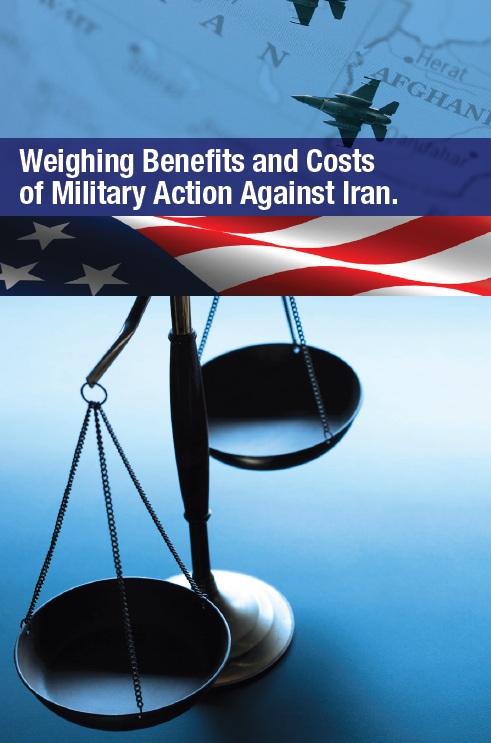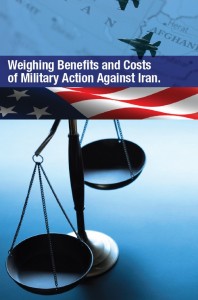
ASP Leadership Endorses New Report, “Weighing the Benefits and Costs of Military Action against Iran”
 The current debate on Iran policy is obscured by political rhetoric and lacking in fact-based analysis. Some advocates for military action downplay the costs and consequences; some critics overemphasize the certainty of disaster.
The current debate on Iran policy is obscured by political rhetoric and lacking in fact-based analysis. Some advocates for military action downplay the costs and consequences; some critics overemphasize the certainty of disaster.
A new report seeks to fill this gap in the Iran debate by clearly laying out the costs and benefits of the military option.
Over thirty senior security experts, including American Security Project CEO Brigadier General Stephen Cheney (USMC Ret.) and ASP board members Admiral William Fallon, USN (Ret.) and Senator Chuck Hagel (fmr R-NE) endorsed “Weighing the Benefits and Costs of Military Action Against Iran.”
The report takes an analytical approach, considering the resources and planning that military action would require and concluding that U.S. action, including airstrikes, cyber-operations, and special forces operations, could delay Iran’s nuclear program by up to four years.
The report neither recommends nor opposes military action; it simply examines the associated efforts and costs, should the United States decide to pursue the military option.
Key findings
- Military action against Iran can be contemplated across a broad spectrum, with significant differences in what objectives could be achieved depending on resources committed by the United States.
- Iran’s nuclear program could be set back four years by a U.S. action including attacks by air, drones, missiles and through cyber as well as by special operations forces. Israel alone might impose delays for up to two years.
Benefits of US military action with the objective to delay Iran’s nuclear program for up to four years could include:
- Damage or destroy Iran’s major enrichment facilities;
- Damage Iran’s military capabilities and ability to retaliate directly;
- Demonstrate to allies and friends U.S. seriousness and credibility;
- Deter nuclear weapons proliferation elsewhere.
Broader objectives such as regime change, damage to Iran’s regional influence or capitulation to U.S. demands, would require sustained, continuing and expanded air and sea warfare, if not a land occupation beyond the scope of Iraq and Afghanistan combined. It is crucial to develop greater clarity on Washington’s objectives vis-à-vis Iran.
Costs of U.S. military action could include:
- Direct Iranian retaliation against U.S. and Israeli facilities, military and civilians around the globe;
- Indirect retaliation against Israel by proxies such as Hezbollah with the same objectives;
- Potential for escalation leading to a broad regional war;
- Significant weakening of global support for sanctions and negotiations, reducing pressure on the regime and improving its prospects for rebuilding;
- Increasing the likelihood Iran will build a nuclear weapon;
- Global economic instability provoked by an oil price spike, as well as regional political instability;
- Damage to U.S. reputation and heightened credibility for extremist groups, particularly in the Muslim world.
This strategic analysis of military action offers much-needed clarification on the Iran nuclear issue. As BGen Cheney noted in ASP’s news release, “By steering clear of overheated rhetoric and relying instead on fact-based analysis, this report makes a significant contribution to the national debate on how to address the Iranian nuclear challenge.”
“In addressing the Iran nuclear challenge, all options should be on the table, including military force. Tehran should understand that we can and will take this option if required,” BGen Cheney concluded.
Weighing Benefits and Costs of Military Action Against Iran






[…] Iran’s program by up to four years. A more detailed analysis of the report is provided by ASP’s Mary Kaszynski. Be Sociable, Share! […]
[…] “By steering clear of overheated rhetoric and relying instead on fact-based analysis, this report makes a significant contribution to the national debate on how to address the Iranian nuclear challenge,” BGen Cheney said on the release of the report. […]
[…] line of reasoning overlooks the fact that military action against Iran would have substantial costs. Taking such a step before exploring our non-military options would be a strategic […]
[…] In the debate over the best way to approach the Iran nuclear standoff, Mr. Netanyahu is frequently at odds with other senior leaders, both in the U.S. and in Israel. Officials on both sides assert that there is still time for diplomacy and sanctions to work. There is also general agreement that while the military option is still on the table, military action would come at a potentially high cost. […]
[…] and, including ASP Board member Adm. William Fallon and ASP CEO BGen. Stephen Cheney, endorsed an analysis of the military option. These security experts noted that the costs and consequences of military action could be […]